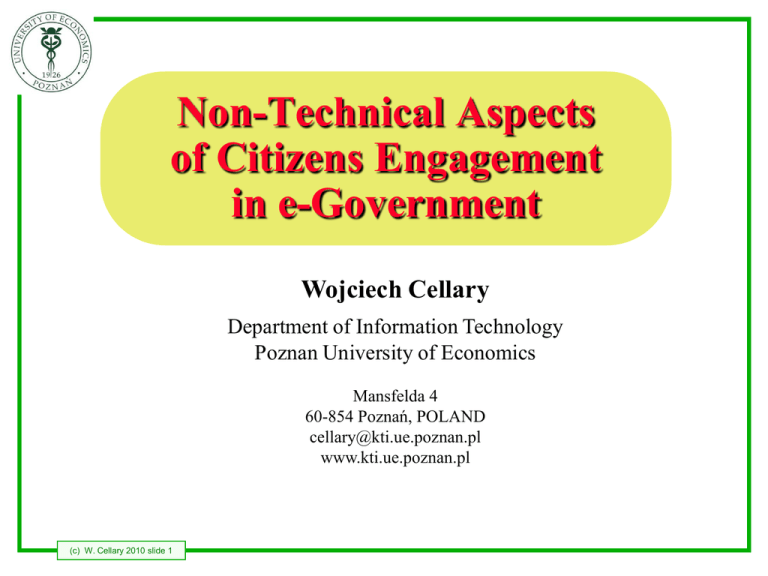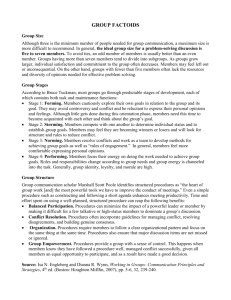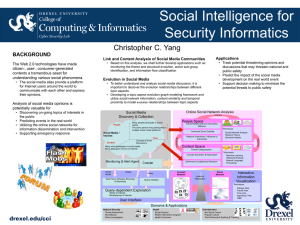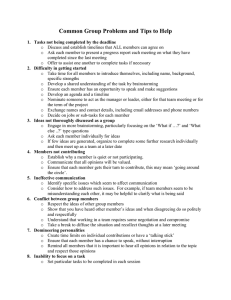Non-Technical Aspects of Citizens Engagement in e-Government Wojciech Cellary
advertisement

Non-Technical Aspects of Citizens Engagement in e-Government Wojciech Cellary Department of Information Technology Poznan University of Economics Mansfelda 4 60-854 Poznań, POLAND cellary@kti.ue.poznan.pl www.kti.ue.poznan.pl (c) W. Cellary 2010 slide 1 Government A government is required to find solutions to problems of a certain community Classical notion of a “community” is related with a territory A territorial community shares some common values, however, it is not homogeneous in all the aspects A community is a result of communication Smaller (c) territory, easier, more frequent and richer (multi-aspect) interpersonal communication More frequent communication, stronger relationships W. Cellary 2010, slide 2 Internet Internet changed the communication, so changed communities too Features of Internet communication: everybody may publish his/her own information, including comments to information published by others information is available everywhere information is available forever – asynchronous communication information may be individually searched information leads to people interested in this information Internet facilitates creation of „content communities” (c) W. Cellary 2010, slide 3 Communities Territorial communities Content communities Communities being a consequence of living together on a common territory Communities being a consequence of the interest in common content Those consequences are not the same (c) W. Cellary 2010, slide 4 Relationships Territorial communities (c) multi-aspect relationships transitivity identity known past emerging authorities following leader’s views (knowledge or trust) hierarchical structure difficulty in leaving a territory common interest and common threats (long-term) aiming at compromise view unification W. Cellary 2010, slide 5 Content communities single aspect relationships non-transitivity anonymity hidden past everyone is authority for himself manifestation of distinctness equality easy leaving a community common interests (short-term) keeping own opinions keeping view diversity Content communities The content communities on the Internet allow their members to learn about a variety of views and opinions from different perspectives Content communities serve rather to exhibit people’s own opinions acquired elsewhere than to accept opinions of others or to unify opinions Anonymity of the content community members leads to the lack of responsibility for one’s words unlimited possibility of changing opinions and positions, a possibility to present contradictory opinions by the same person using different nicknames Single-aspect relationships conduct to the radicalization of opinions on a given subject unconsidered contexts unconsidered multiple aspects of a problem Lack of social pressure no drivers to achieve a consensus Lack of the hierarchy a word of a fool equal to a word of a sage (c) W. Cellary 2010, slide 6 Citizen’s engagement Citizen’s engagement is required to: 1. Elect a government 2. Guide the government how to solve problems During government election content communities (which are single-aspect) aim at convincing many voters each voter decides on behalf of him/herself the result of many votes is a single government During guiding the government how to solve a problem (c) content communities (which are single-aspect) aim at convincing a single government the result of government decision influence the whole territorial community only partially represented by content communities W. Cellary 2010, slide 7 Conclusions When talking about citizen’s engagement via Internet, it is necessary to take into account characteristics of content communities content communities does not represent the whole territorial community content communities easier represent negative opinions than the positive ones (c) W. Cellary 2010, slide 8 Conclusions Content communities may provide a government with a variety of partial views, but cannot exempt a government from a harmonized solution for the benefit of the whole territorial community (c) W. Cellary 2010, slide 9 Thank you Wojciech Cellary (c) W. Cellary 2010, slide 10



